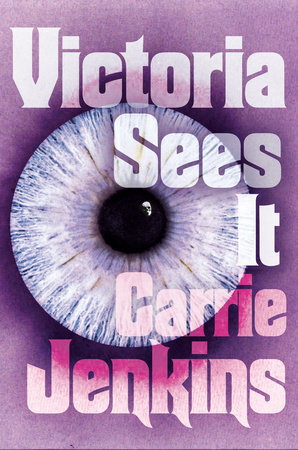Shortlisted for the Frye Academy Award XIII
Shortlisted for the Ethel Wilson Fiction Prize (BC Yukon Book Prizes)
In Victoria Sees It, Carrie Jenkins pursues the idea of women's madness: its origins, its structures, and, most radically, its insights. When I began reading this beguiling story, I was put in mind of Charlotte Brontë, as the main character is a cross between the odd and serious Jane Eyre and the raving, attic-bound Mrs. Rochester. Jenkins’s voice manages the rare feat of being remarkably intelligent and complex, while being fast paced and engaging. A brilliant thriller about the infinite corridors and wondrous nooks and crannies of women’s minds. — Heather O’Neill
Available as an audiobook!
Read by Victoria Carr
Coverage and Reviews
Debut novelist Carrie Jenkins has written a dark, propulsive and original novel: A feminist interrogation of madness, wrapped in a gothic mystery … Victoria Sees It is more than a thriller. It’s a novel about institutional power — who has it, and what they do with it … Jenkins diverts a familiar literary journey— the heroine’s descent into madness— into unfamiliar, thrilling territory. — Michelle Cyca
For those looking for a slow, simmering literary thriller. Victoria Sees It is an interior novel, revealing Victoria’s rich inner life and perspective on what’s happening around her. When she is born, her mother stops speaking and is institutionalized; Victoria goes on to live with her aunt, who cares for her, and her uncle, a realistic enough sort of villain. A bright kid, if weird, she eventually ends up on scholarship at an all-girls boarding school her family still can’t quite afford, and then she ends up at Cambridge, where she makes her first-ever real friend. All goes well — maybe for the first time in her life, socially — until Victoria’s friend vanishes. Complex and destabilizing, this book is a puzzle that begins in one place and ends up somewhere unexpected.
Victoria is the queer, neurodivergent narrator we’ve been waiting for. Raised by an aunt after her mother goes to an asylum, she grows up to attend Cambridge with a scholarship. There she forms an intimate friendship with a girl who disappears. Victoria goes on a desperate, wide-ranging search to find out what happened to her. Timely in its issues and timeless in its passion, this lyrical mystery will appeal to fans of Donna Tartt and Shirley Jackson.
An audacious, unsettling book, culminating in a series of dark twists that ratchet its initial intrigue towards a neo-gothic crescendo of madness and paranoia, as Victoria struggles to orient and assemble meaning while captive in a world whose categories and coordinates have been rendered deliberately unfair and malevolently confused. — Anthony Oliveira
A circuitous and gripping exploration of femininity and madness. — Shereen Lee
With vivid language and eerie scenes, Victoria Sees It is an anxious trek through the mysteries of loss and self-exploration. Reading it will keep you wondering if everything around you is truly as it seems. — Asmaa Toor
An oddly riveting narrative and mystery, one you might wish to read in a sitting, compulsively driven to peel away the layers of Victoria’s story and that of her catatonic mother … Victoria Sees It is a tightly woven, arresting narrative about sensitive and pertinent subjects, entwined with reverberating haunting images. Pay attention when you read it; you will be, like the narrator, “always on the verge of seeing something.” — Kathy Mezei
Carrie Jenkins … has written an uncomfortable, and tragically heartless first novel. Fiction’s standard niceties—scenic verisimilitude, objective description, order, meaning, time—are toyed with, or discarded entirely. Instead, Jenkins charts a bitterly subjective and postmodern path through questions of meaning and reality: a self-contradicting and inconclusive mystery novel, a bildungs-roman built on a downward spiral. — Paige Cooper
Advance Praise
Carrie Jenkins’s novel is as intimate as it is intense. This rich thriller delves into the muck of academia—the sexism and classism and politicking that proliferates in the cracks of Cambridge and beyond. Her Victoria is a seeker, one with an astute awareness of behavioural quirks and an encyclopaedic knowledge of all things Sherlock Holmes and Hercule Poirot.” — Daniel Viola
For fans of Donna Tartt, this book—like most ‘hysterical’ women—is too smart to be dismissed. — Sruti Islam
Victoria Sees It is delightful and disorienting, wretched and wry. Reading it is like rummaging through boxes in a crowded attic: you become subsumed, sifting through layers of memory while some barely-noticed haunted thing watches you from a dark corner. — Ziya Jones

